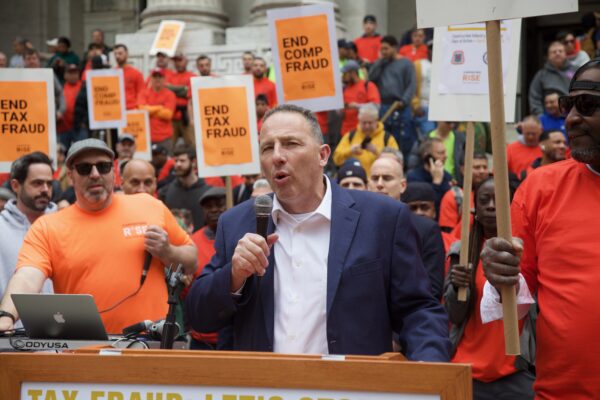October 2, 2015
By Steven Wishnia
Close to 1,000 City University of New York faculty and staff packed the street outside chancellor James Milliken’s Upper East Side apartment at 8 in the morning Oct. 1, demanding that he push the state for funds to give them their first raise in six years.
Contract talks have been “very active,” said Professional Staff Congress spokesperson Fran Clark, but there is still no offer on the table. The PSC represents 25,000 faculty and professional staff at CUNY.
With police putting up crime-scene tape to contain the overflow crowd, the demonstrators lined East 68th Street in front of the 33-story luxury apartment building, carrying ringing alarm clocks and clicking Purim groggers. “It’s a wake-up call. He’s lucky we don’t have the roosters here,” said Iris DeLutro, who runs programs that train school paraprofessionals to become teachers through CUNY’s Murphy Institute.
The chancellor, who has been in office for a year, “needs to make it a real public campaign” to win the state funds needed to give staff a raise, DeLutro added. “He’s not using the bully pulpit. He can’t play it safe.”
The city has indicated it’s willing to give CUNY faculty and staff a contract similar to those it’s given other municipal unions—generally a seven-year deal retroactive to 2010, with raises totaling 10-11%—says PSC President Barbara Bowen, “but the state has not allocated any funds for the contract.” Chancellor Milliken, she adds, “has spoken up about it,” but has not delivered “a strategy for combating economic austerity at CUNY.”
“A lot of our fight is with Albany,” said Tahir Butt, a graduate assistant in education at Brooklyn College. “We’re pushing our new chancellor to stand up for his teachers and students.”
City University faculty “perform a great service. We teach those who need it the most,” said College of Staten Island professor Frank Galati, who has been teaching architecture, math, and engineering in the system for almost half a century. But though they teach at the city’s university, they often don’t make enough money to actually live in the city, he added. “If I didn’t have a rent-stabilized apartment, I couldn’t live here,” he said. “I have people in my department who live in South Jersey and Westchester because they can’t afford to live here.”
The 10,000 CUNY support workers represented by various District Council 37 locals are experiencing similar contract problems. The more than 2,000 custodial assistants are “going on seven years” without a raise,” said Local 1597 President Eric Latson. “The chancellor and the governor haven’t gotten together to offer us even a bad contract.” CUNY normally follows the pattern set with other city unions, he added, “but they don’t want to this time” and haven’t given a reason.
Bowen contends that both the state and city have the money to pay for raises, smaller classes, and more job security for the part-time adjunct professors who teach close to half CUNY classes. The state found $250 million last June to reimburse parochial schools for performing mandatory tasks such as taking attendance and giving students vaccinations, she notes. She believes the reason the state isn’t increasing funds for CUNY is that the Cuomo administration isn’t making it a priority to educate the black, Latino, immigrant, and low-income students who make up most of the universities’ population.
“Everybody at this demonstration could tell you how to give a good education,” she says. “There’s no political will to give a first-rate education to the students we teach.”



